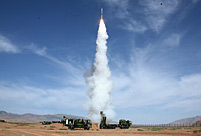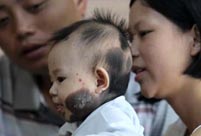Pastries, crab, Moutai
It is not the first time the central government tried to regulate the mooncake market. In 2006, at a time when the pastry's packaging was getting ever-more sumptuous, the government stipulated that the cost of the packaging could not account for more than 25 percent of the factory expense of the item.
Manufacturers sought new ways to enhance the luxury value and began stuffing mooncakes with expensive fillings like truffle and abalone.
While traditional mooncakes are filled with red-bean paste and lotus seeds and cost 5 to 6 yuan, the tendency to turn them into luxury items has persisted.
It was even joked about. During last Mid-Autumn Festival, Chinese film director Feng Xiaogang wrote on his micro blog that if anyone wanted to give him an expensive gift, he would prefer cash to mooncakes.
But this year is different. Not only has the overall volume of mooncake sales declined, so has the price, in spite of the general inflation. Feng from the Shanghai association said that 78.6 percent of the mooncakes sold in Shanghai cost less than 200 yuan for packages with six to eight pastries.
And only 14 out of the 406 kinds of packed mooncakes cost more than 400 yuan, the so-called luxury mooncakes.
The main victims of the mooncake crackdown are the five-star hotels and high-end restaurants, and their suppliers of luxury mooncakes.
The marketing manager at the Ritz Carlton, Shanghai Pudong told China Business News that mooncake orders from pharmaceutical companies are almost zero, likely a result of a recent anti-corruption investigation initiated by the government. Other five-star hotels confirmed that orders from State-owned companies and the government have dropped by at least 50 percent this year, even though the hotels are offering up to 40 percent discounts.
A manager named Su at a food-processing factory in Nanjing, Jiangsu province, said that his hotel clients have cut about 30 percent of mooncake orders this year, mainly because of the policy. Most Chinese five-star hotels outsource their mooncake baking.
Other popular alternatives among festival gifts are also having a tough time.
Yang Weilong, director of the Crab Association of Yangcheng Lake in Jiangsu province, said the crab season has just started but sales are likely to take a heavy hit from the anti-corruption policy.
Yang predicted that local dealers sales will fall by 30 percent year-on-year, and he said that sellers would be unlikely to recoup the 10 percent inflation in costs of producing the "divine lake food" this year because of the bleak market.
Sales of Moutai, the Chinese liquor, have plunged since the beginning of this year, also because of the campaign against lavish spending. Kweichow Moutai Co Ltd, China's top liquor producer, reported "close-to-flat" revenue growth in the first half of the year, the lowest since it was listed in 2001.


 Pakistan suffers desperate shortage of water
Pakistan suffers desperate shortage of water New model of indigenous surface-to-air missiles testfired
New model of indigenous surface-to-air missiles testfired  Heritage train ride across western Kosovo
Heritage train ride across western Kosovo Baby girl 'too young' for birthmarks treatment
Baby girl 'too young' for birthmarks treatment Beijing court hears airport blast case
Beijing court hears airport blast case Harbin named Chinese city with most beautiful women
Harbin named Chinese city with most beautiful women Wushu spirit
Wushu spirit Rugby girls
Rugby girls Funniest photos of sport stars as kids
Funniest photos of sport stars as kids  Residences of the royal house of Savoy
Residences of the royal house of Savoy China's frigate 'Bengbu'in fire training
China's frigate 'Bengbu'in fire training The last days of Wan Aihua
The last days of Wan Aihua Highlights at 12th National Games of China
Highlights at 12th National Games of China Beijing Film Academy welcomes freshmen
Beijing Film Academy welcomes freshmen 2013 Taiwan Int'l Tourism Expo kicks off in Taipei
2013 Taiwan Int'l Tourism Expo kicks off in TaipeiDay|Week|Month